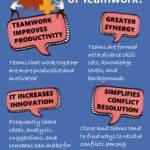
How to Improve Group Dynamic in the Workplace
To improve group dynamic in the workplace, it is important and necessary to invest time in team building activities. Team building activities aren’t just fun, but they also promote trust, collaboration, and understanding among team members.
These activities can range from fun icebreakers to more structured team challenges or retreats. By creating opportunities for team members to bond, learn about each other’s strengths and weaknesses, and work towards common goals outside of regular work tasks, you can strengthen relationships and improve group dynamics.
Causes of Poor Group Dynamics
Not only are team building activities important, but there are also many ways that problems can occur within a group dynamic. Some of these include:
- Lack of Communication: When team members don’t communicate effectively, it leads to misunderstandings, conflicts, and a breakdown in trust.
- Lack of Clear Goals: Without clear goals or objectives, team members may feel directionless, leading to confusion and reduced motivation.
- Poor Leadership: Ineffective or micromanaging leadership can demotivate team members, hinder decision-making, and create a negative work environment.
- Limited Diversity: Homogeneous teams may struggle with creativity and innovation, as diverse perspectives and ideas are essential for problem-solving.
- Conflict and Personality Clashes: Personality clashes, unresolved conflicts, and differing work styles can create tension within the team and impede collaboration.
- Lack of Trust: When trust is lacking among team members, it can lead to a reluctance to share ideas, collaborate, or take risks, hindering overall group performance.
- Unequal Contribution: If some team members consistently contribute more than others, it can lead to resentment, imbalance in workload, and a sense of unfairness.
- Poorly Managed Meetings: Unproductive or poorly managed meetings can waste time, decrease morale, and contribute to a sense of disorganization within the team.
- Lack of Recognition: Failing to recognize and appreciate team members’ contributions can lead to low morale, decreased motivation, and a lack of commitment to the team’s goals.
(Reference: https://www.teambonding.com/)


